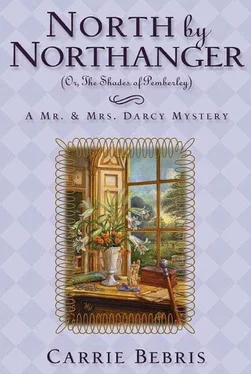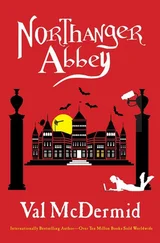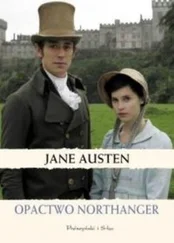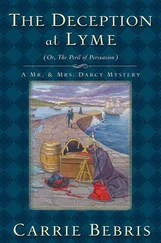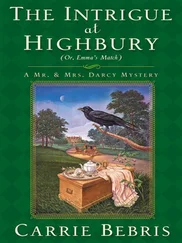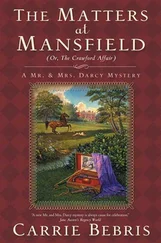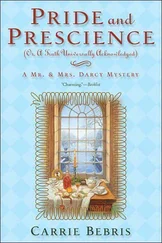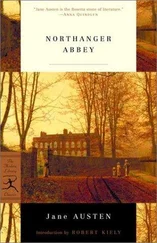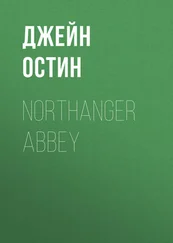“Mr. Thorpe.” Henry turned to Darcy. “Mr. Darcy, meet Mr. John Thorpe, Mrs. Stanford’s brother.”
Mr. Thorpe was found to have suffered a sprained wrist, which he complained about to the point where one would think he had broken his arm. At least the injury relieved him of the danger of driving any vehicle through the treacherous curve again. That fact did not, however, prevent him from rattling on about its hazards. “The road positively bends in half. A death trap! Absolutely perilous!”
“Mr. Thorpe,” Henry said, “if you must air your vocabulary, I would prefer you use it to explain the night you entertained the Darcys at Northanger Abbey. As my brother.”
“Upon my soul, that was a jolly night, was it not, Mr. Darcy? Isabella always could design a wickedly clever scheme. The look on your faces when I first walked in the room — it was capital! Never had such an amusing evening in my life. So glad Captain Tilney issued the invitation before he died — I was happy to step in when he could not keep the engagement.”
“To what end?” Darcy asked.
“To learn about those ivories the captain promised Belle, that’s what.”
“I somehow doubt my brother promised Mrs. Stanford anything of the sort.”
“I am certain that he meant to give them to me,” Isabella said. “Frederick had contemplated contacting the Darcys from the time he learned of Mr. Wickham’s connection to the family. When Wickham heard from his wife that they were looking for some sort of treasure at Pemberley, I said, ‘See? The Darcys know something about those ivories after all. If they find them, you should ask for them back.’ He laughed and said, ‘You would like that, would you not?’ So I know he wanted me to have them.” She sighed dramatically. “Since poor Frederick did not live long enough to give them to me himself, completing his unfinished business was the least I could do for him.”
“You mean for yourself,” Mr. Tilney said.
“Oh, Belle said she would share them,” Mr. Thorpe said. “Once the captain died, she fretted that you would misunderstand Frederick’s intentions, so we had to find them for ourselves. You are a cagey fellow, Mr. Darcy! Could not get much information from you directly, or find a thing in your trunks while you were at dinner, but Belle heard enough through the servants’ doors. Shame you had to go and spoil everything by leaving our party before Wickham had the maid installed at Pemberley. He and Belle had a fix for that, though. What did you think of the cane? An exceedingly faithful copy, was it not?”
“It was.” Darcy looked at Wickham. “I understand a Mr. George Darcy commissioned it.”
Wickham grinned smugly. “Mr. George Darcy purchased a great many things that season. I never imagined at the time how useful that particular item would prove.”
“But the diamonds were my inspiration,” Isabella said boastfully. “They were the very thing to prevent your returning home too soon. The letter to the constable was mine, as well. Did it not work beautifully?”
“You always were a practiced letter writer,” Mr. Tilney said.
“Just as well you did leave early, though,” said Mr. Thorpe. “That plaguesome old butler returned before we were expecting him and we had to brush off.”
Darcy could scarcely believe his ears. They had plunged him into a morass of dire legal difficulties simply to delay his return home for a few days? Moreover, they appeared utterly insensible to the consequences of their actions. “Do you comprehend that I faced hanging for the crime of which I stood accused?”
“Fiddlesticks!” said Mr. Thorpe. “You are a gentleman. What is the law to you? It will not give a gentleman trouble.”
“We shall see whether you still believe that come the morrow.”
“Mrs. Stanford,” said Mr. Tilney, “if you wanted something by which to remember my brother, why did you not simply take the diamonds for yourself while you were at Northanger Abbey? You could have dispensed with the hunt for the statuettes altogether.”
“The ivories held more value— sentimental value.” Isabella adopted an innocent expression. “Besides, if I had kept those diamonds, that would be stealing. The statuettes, in addition to having been promised to me, were just lying around somewhere waiting to be found. We would have been rescuing them, really.”
Darcy yet held his mother’s statuette in his hand. “As you rescued this one?”
“I cannot imagine why that servant girl thrust that statue at us. Of course that one is yours. There must have been some misunderstanding.”
Much as he wanted to interrogate the party further, Darcy was anxious to return home. He was also in serious doubt as to whether any of the accomplices had anything useful to say. He and Mr. Tilney determined that they would all proceed to the inn at Lambton, where they could send for the apothecary and the constable. The conspirators rode in Mr. Tilney’s post chariot while Darcy followed on horseback.
By the time everybody emerged from Mr. Tilney’s carriage at the inn, the party had apparently become engaged in a quarrel over who was to blame for their having been caught.
“We would not have overturned if you had not insisted upon driving.”
“It was not my driving, it was the deuced road!”
“Had we traveled post, Mr. Darcy would not have overtaken us.”
“You are the one who insisted we stop at Lambton to retrieve our belongings... ”
Darcy was rather glad for his own solitary journey to the inn. Henry Tilney appeared the way Darcy felt after an hour spent with his mother-in-law.
The conspirators entered the inn. After asking a servant to send for the constable, Mr. Tilney shook his head in bemusement and looked at Darcy. “One wonders how three such shallow, selfish people managed to devise a plot of such serious consequence.”
“One wonders how the three of them managed to cooperate long enough to execute it.”
“It must relieve you to apprehend them and settle the matter of the diamonds. Now they will stand trial in Gloucestershire instead of you.”
“I am indeed glad for it, but I confess to distraction. When I left Pemberley to pursue them, Mrs. Darcy had just been brought to childbed.”
Henry’s face lit with genuine delight. “That is capital news. May I congratulate you on a son, or on a daughter?”
“I do not yet know.”
“Good heavens, Mr. Darcy! You should be at home, not chasing ruffians about the countryside. Why did you not say something sooner?”
“I did not want to leave you alone with our merry trio.”
“I have matters well in hand, and shall come to Pemberley in a few days with a report, if you like. But for now I bid you adieu. Get thee to your wife, my friend.”
How well the expression of heart-felt delight, diffused over his face, became him.
—
Pride and Prejudice
He arrived too late.
The moment he entered the house, Darcy sensed that something within it had changed. Elizabeth’s trial had ended. Though he had won her prize back for her, returned with the ivory in hand, he had not reached her in time.
And she had come through her travail just fine.
His heart nearly stopped — and his breathing did — upon seeing her again. And upon beholding his child for the first time.
’Twas the darkest hour of night when he passed into the bedchamber. No sign remained of the struggle this room had witnessed just hours earlier. All in the household, save Mrs. Godwin and a nurse attending mother and child, had gone to bed. He was spared any noisy effusions of Mrs. Bennet or blunt declarations from Lydia and could behold his wife in quiet as she lightly dozed, a tiny bundle at her side.
Читать дальше
